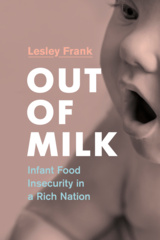
Food Will Win the War
The Politics, Culture, and Science of Food on Canada’s Home Front
During WWII, as Canada struggled to provide its allies with food, public health officials warned that malnutrition could derail the war effort. In response, the state asked citizens to put their diets on a war footing through food rationing, menu substitutions, and household production. Posters asked women and children to “Eat Right, Feel Right” because “Canada Needs You Strong” while cookbooks helped ordinary housewives become “housoldiers.”
Food Will Win the War explores both the symbolic and material transformations that food and eating underwent on the home front and the profound social, political, and cultural changes that took place in Canada during the 1940s. Through the development of nutritional policies and official food rules and guides, the state took unprecedented steps into the kitchens of the nation, transforming the way women shopped and cooked, what their families ate, and how people thought about food. Canadians, in turn, rallied around food and nutrition to articulate different visions of citizenship.
By focusing not only on the production, consumption, distribution, and regulation of food but also on its symbolic and cultural meaning, this incisive account of the formative years of nutrition in Canada links the gendered politics of home life to the wartime policies of the state.
This book will appeal to students and scholars of health and nutrition, food studies, consumerism, the Second World War, and the history of gender, citizenship, and the welfare state.
Awards
- 2015, Joint winner - Political History Group Book Prize, Canadian Historical Association
Both books [Mosby’s Food Will Win the War as well as well as A Small Price to Pay: Consumer Culture on the Canadian Home Front by Graham Broad, UBC Press 2013] are much needed additions to the historiography of Canada’s Second World War Experience. Too often have the daily lives of those on the home front been overlooked in favour of the stories of the men and women who marched away in khaki. Those who remained behind – 90 percent of Canadians – also had their worlds fundamentally transformed by war, as these books demonstrate. Specialists will certainly appreciate these works, but both are accessible and appealing to a general audience as well.
This significant new work offers readers a taste of life on the home front during the war years by giving us a glimpse into the shopping baskets and a general sense of the day’s routine of Canada’s home food providers – the volunteer home housoldiers.
Equal parts social, political, gender, and intellectual history, Food Will Win the War is an exceptional book that documents the history of WWII through the history of food. It is engaging, beautifully crafted, and convincingly argued.
Introduction
1 “Eat Right, Feel Right – Canada Needs You Strong”: Food Rules and the Transformation of Canada’s Wartime Nutritional State
2 The Kitchen and the State: Food Rationing, Price Control, and the Gender Politics of Consumption
3 Mobilizing Canada’s “Housoldiers” and “Kitchen Commandos” for War: Food, Volunteers, and the Making of Canada’s Home Front
4 Tealess Teas, Meatless Days, and Recipes for Victory: Transforming Food Culture and Culinary Practice in Wartime
5 The Politics of Malnutrition: Nutrition Experts and the Making of Canada’s Postwar Welfare State
Conclusion
Notes
Index











